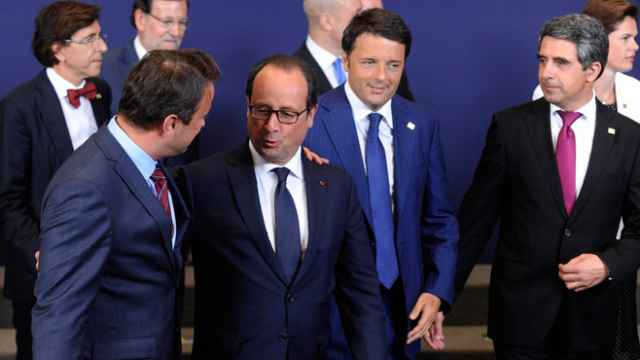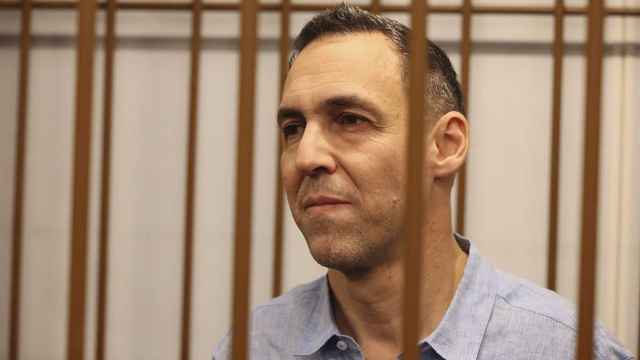Russian stocks extended losses on Monday afternoon as the European Union sent mixed messages on a new package of sanctions over Russia's actions in Ukraine despite Friday's peace deal between Kiev and separatist rebels.
The dollar-denominated RTS index was down 0.9 percent at 1,245 points, and its ruble-based peer MICEX was 0.7 percent lower at 1,465 points.
After weakening about 0.5 percent against the dollar and euro during the day, the ruble regained its losses to reach 36.9 to the dollar and 47.8 to the euro by 8 p.m. The ruble was trading at 41.8 against the dollar-euro basket.
Russian assets had been down in the morning as the sanctions were anticipated, but stock indexes nevertheless added around 0.5 percent to their losses after the new sanctions were unveiled. The EU announced that it would delay signing off on the new package too late for the markets to react.
As expected the sanctions target lending to major state oil firms including Rosneft, Gazprom Neft and pipeline operator Transneft.
Rosneft was down 1.7 percent, Gazprom Neft down 2.4 percent, and Transneft down 2.3 percent.
However, the falls in Russian stocks were broad-based, including companies not included in the latest sanctions. Sberbank was down 1.9 percent, though gas group Gazprom recovered losses to finish the day flat.
EU leaders agreed the new sanctions on Friday, deciding to proceed with them despite the peace deal between Ukraine and separatist rebels, diplomatic sources told Reuters.
"A ceasefire must hold for sanctions to be lifted," a senior EU diplomat said on Friday.
But later in the day, the EU changed tack, saying they would delay the new measures to see whether the cease-fire holds.
Russia's Prime Minister Dmitry Medvedev said in an interview published on Monday that Russia would respond "asymmetrically" to any new western sanctions, including possibly a ban on European airlines crossing Russia.
Ukraine and pro-Russian rebels reached a ceasefire agreement on Friday, but fighting flared over the weekend in eastern Ukraine, jeopardising the deal.
The OSCE security watchdog said on Monday that "overall the ceasefire held though it is still shaky."
"The market does not fully believe that military actions have ceased ... in Ukraine, as there have been previous attempts to call a ceasefire but the truce had not lasted long," Natalia Samoilova, head of analyst at Golden Hills-Kapital investment house in Moscow, wrote in a note.
ING analyst Dmitry Polevoy said that investors were unnerved by comments from east Ukrainian rebels in which they reiterated demands for independence from Kiev despite Friday's peace deal.
The ruble was also coming under pressure because of falling oil prices, Polevoy added.
Brent fell below $100 per barrel on Monday, having shed over $2 since Friday morning, following an unexpected fall in Chinese imports which suggests China's economy is weak.
Other market participants emphasized the continuing threat of further Western sanctions.
"The conclusion of a truce hasn't lowered the pressure from western countries, and in some directions we are seeing it strengthening. In this situation the ruble is quite vulnerable," commented Igor Zelentsov, senior trader at Globex bank.
Material from the Moscow Times was included in this report.
A Message from The Moscow Times:
Dear readers,
We are facing unprecedented challenges. Russia's Prosecutor General's Office has designated The Moscow Times as an "undesirable" organization, criminalizing our work and putting our staff at risk of prosecution. This follows our earlier unjust labeling as a "foreign agent."
These actions are direct attempts to silence independent journalism in Russia. The authorities claim our work "discredits the decisions of the Russian leadership." We see things differently: we strive to provide accurate, unbiased reporting on Russia.
We, the journalists of The Moscow Times, refuse to be silenced. But to continue our work, we need your help.
Your support, no matter how small, makes a world of difference. If you can, please support us monthly starting from just $2. It's quick to set up, and every contribution makes a significant impact.
By supporting The Moscow Times, you're defending open, independent journalism in the face of repression. Thank you for standing with us.
Remind me later.





